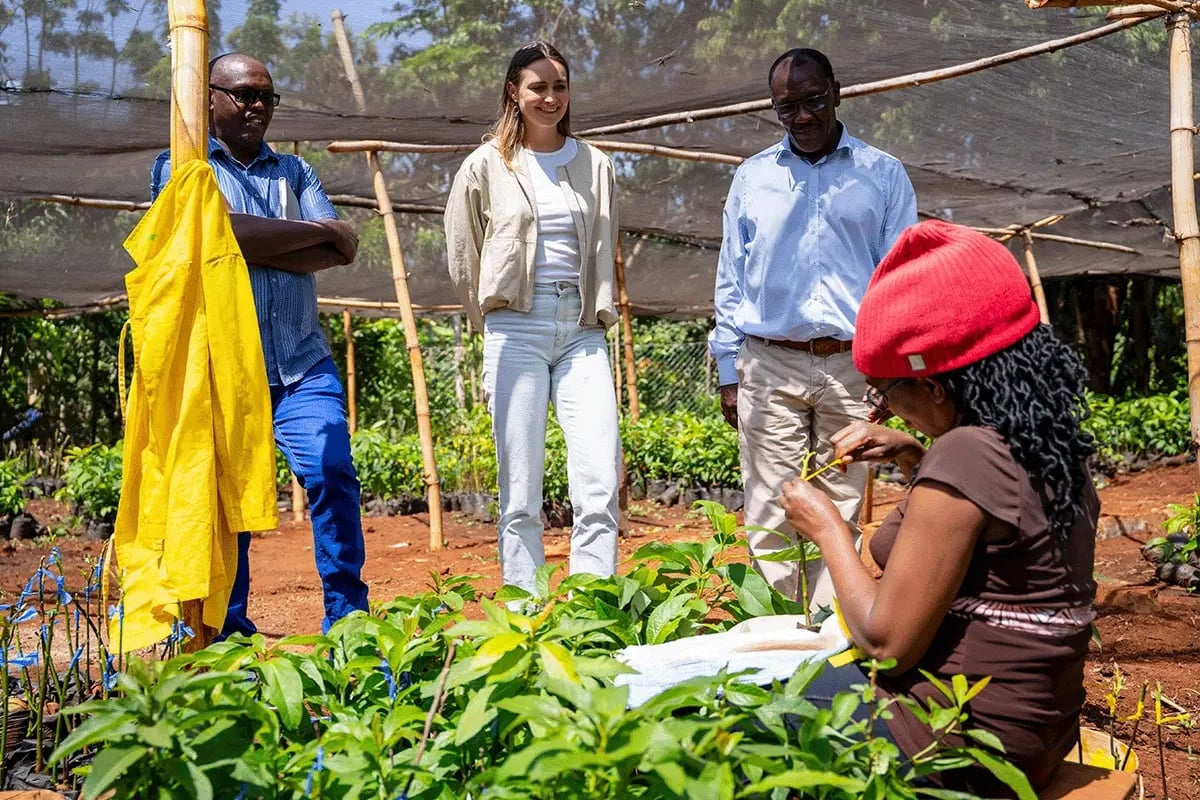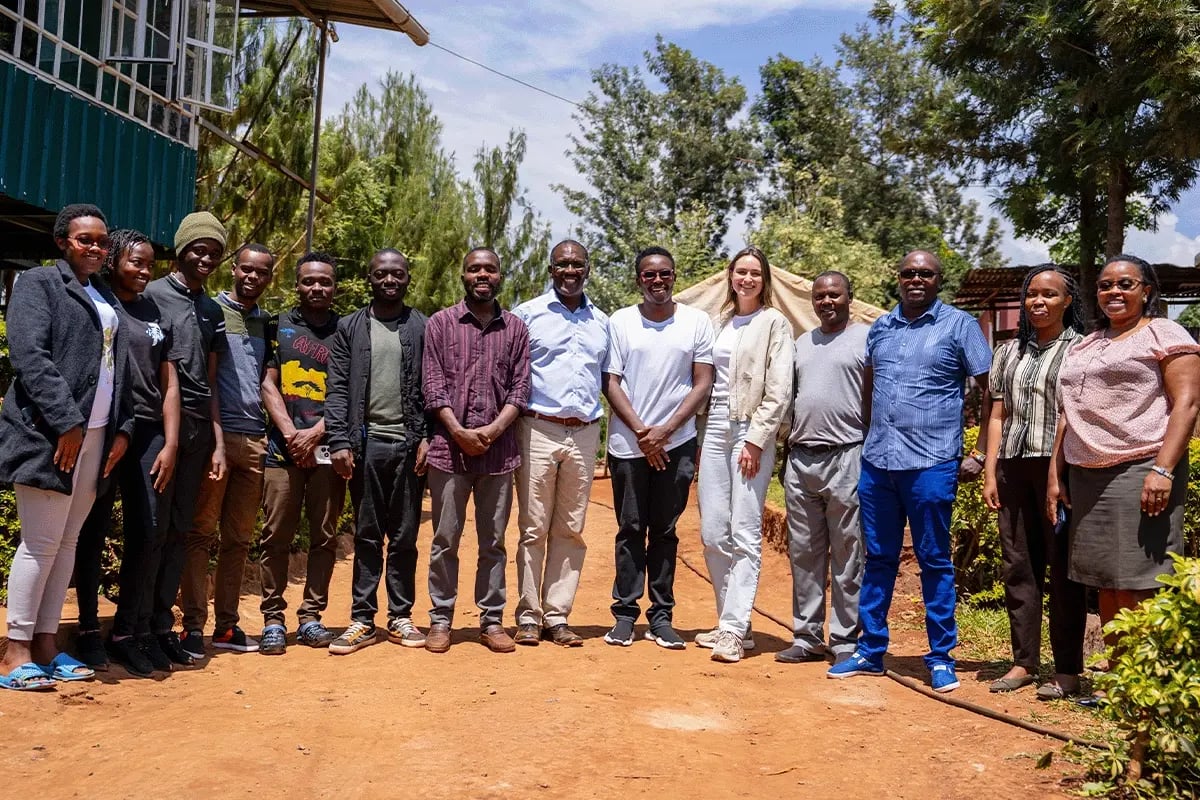Our nature-based solutions are more than just projects—they are catalysts for lasting change, empowering communities and restoring ecosystems. Our Environmental Solutions Manager, Wienke Schouwink, recently embarked on a field visit to our project sites in Kenya, showcasing firsthand how our initiatives are transforming lives and landscapes. Through meaningful collaborations, cutting-edge sustainability techniques, and community-driven efforts, we are redefining what it means to invest in a greener, more resilient future.
 Wienke Schouwink meeting DGB team members from Kenya at a tree nursery. Hongera Reforestation Project, DGB.
Wienke Schouwink meeting DGB team members from Kenya at a tree nursery. Hongera Reforestation Project, DGB.
Visit to the Akili office and avocado nursery
At the Akili office, Wienke was warmly welcomed by Haron, James, and Moses, who play key roles in training farmers and local communities on tree planting, tree care, and the effective use of energy-efficient cookstoves. Regular training sessions ensure that farmers stay updated on best practices, maximising the success of our reforestation and agroforestry initiatives.
 Wienke Schouwink at a tree nursery in Kenya. Hongera Reforestation Project, DGB.
Wienke Schouwink at a tree nursery in Kenya. Hongera Reforestation Project, DGB.
At the office, a dedicated data development team meticulously tracks all project activities and key performance indicators (KPIs). In compliance with Verra and Gold Standard requirements, both digital and paper records are maintained for transparency and accuracy.
 DGB team members learning about avocado grafting. Hongera Reforestation Project, DGB.
DGB team members learning about avocado grafting. Hongera Reforestation Project, DGB.
One of the highlights of the visit was learning about avocado grafting, a technique that enhances disease resistance and fruit quality by combining different plant varieties. Local workers are trained in this specialised process, enabling them to cultivate robust, high-yield avocado trees. A notable success story from the project is a farmer who planted 150 avocado trees two years ago and recently celebrated his first harvest.
Discover the Hongera Reforestation Project, Kenya
The nursery houses approximately 50,000 seedlings, supporting not just reforestation but also local agribusiness. During the visit, Wienke witnessed local workers preparing and loading young seedlings onto trucks for transport. Additionally, the project produces dried hibiscus, tea, and honey, creating alternative income streams for farmers. With demand for hibiscus exceeding supply, there is potential for expansion. While hibiscus is not part of our carbon offset programme, it serves as a valuable companion crop alongside avocado and macadamia trees.
Read more: The power of DGB Group’s high-quality carbon projects in Kenya
Visit to the cookstove factory
At the cookstove factory, Wienke met with Diana, the factory manager, along with Moses and James. Diana provided an in-depth walkthrough of the cookstove production process:
- Clay preparation: Four strong workers mix and stomp the clay before moulding. Each worker produces 150–200 stoves per day, which then dry for about two weeks.
- Shaping and refinement: The dried clay forms are refined using iron moulds to ensure a perfect fit into the metal exteriors.
- Ovens: The stoves are fired in large ovens, with each oven holding approximately 170 stoves.
- Metal exterior: The outer metal casings, essential for durability, are handcrafted and individually numbered for tracking.
- Assembly and painting: The clay pots are inserted into the metal exteriors, reinforced with additional clay, and painted for a finished look.
 Wienke and Diana in a cookstoves factory. Hongera Energy Efficient Cookstoves Project, DGB.
Wienke and Diana in a cookstoves factory. Hongera Energy Efficient Cookstoves Project, DGB.
Our energy-efficient cookstoves reduce wood consumption by approximately 60%, saving local households time and money by allowing them to source fuel more sustainably by pruning trees on their farms or purchasing less wood from local vendors. Our field teams continuously train farmers on responsible firewood harvesting to maintain a sustainable balance.
Read more: Building healthier homes: more cookstoves distributed in Kenya
The factory has become a sought-after workplace in the region, employing around 70–80 full-time staff, with numbers increasing to 100 during peak seasons. Its popularity underscores the economic impact of our initiatives, providing stable employment opportunities while driving sustainable development.
Discover the Hongera Energy Efficient Cookstoves Project, Kenya
Wienke’s field visit reaffirmed the transformative impact of our projects in Kenya. From empowering farmers with sustainable agroforestry techniques to producing life-changing cookstoves, our initiatives continue to enhance livelihoods, promote environmental conservation, and drive positive change in local communities.
 Wienke, DGB team members, and the farmers are together at a tree nursery. Hongera Reforestation Project, DGB.
Wienke, DGB team members, and the farmers are together at a tree nursery. Hongera Reforestation Project, DGB.








